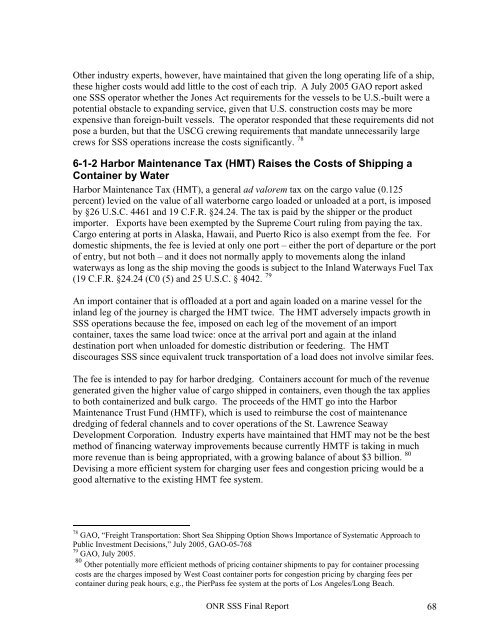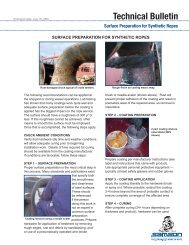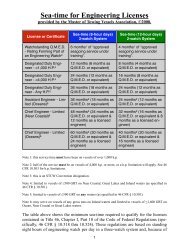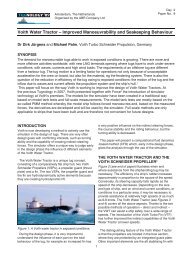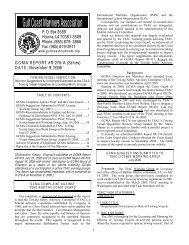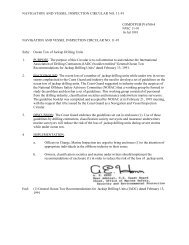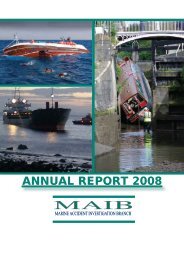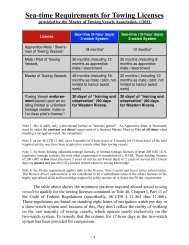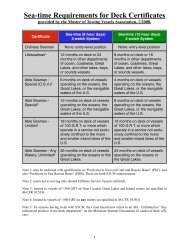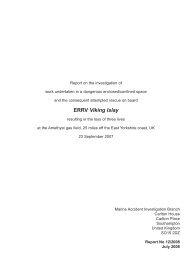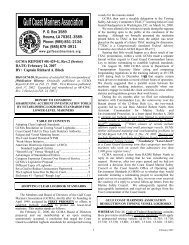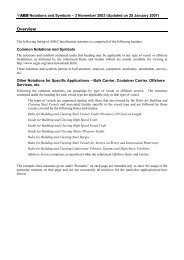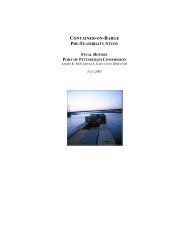Office of Naval Research - National Transportation Library
Office of Naval Research - National Transportation Library
Office of Naval Research - National Transportation Library
You also want an ePaper? Increase the reach of your titles
YUMPU automatically turns print PDFs into web optimized ePapers that Google loves.
Other industry experts, however, have maintained that given the long operating life <strong>of</strong> a ship,these higher costs would add little to the cost <strong>of</strong> each trip. A July 2005 GAO report askedone SSS operator whether the Jones Act requirements for the vessels to be U.S.-built were apotential obstacle to expanding service, given that U.S. construction costs may be moreexpensive than foreign-built vessels. The operator responded that these requirements did notpose a burden, but that the USCG crewing requirements that mandate unnecessarily largecrews for SSS operations increase the costs significantly. 786-1-2 Harbor Maintenance Tax (HMT) Raises the Costs <strong>of</strong> Shipping aContainer by WaterHarbor Maintenance Tax (HMT), a general ad valorem tax on the cargo value (0.125percent) levied on the value <strong>of</strong> all waterborne cargo loaded or unloaded at a port, is imposedby §26 U.S.C. 4461 and 19 C.F.R. §24.24. The tax is paid by the shipper or the productimporter. Exports have been exempted by the Supreme Court ruling from paying the tax.Cargo entering at ports in Alaska, Hawaii, and Puerto Rico is also exempt from the fee. Fordomestic shipments, the fee is levied at only one port – either the port <strong>of</strong> departure or the port<strong>of</strong> entry, but not both – and it does not normally apply to movements along the inlandwaterways as long as the ship moving the goods is subject to the Inland Waterways Fuel Tax(19 C.F.R. §24.24 (C0 (5) and 25 U.S.C. § 4042. 79An import container that is <strong>of</strong>floaded at a port and again loaded on a marine vessel for theinland leg <strong>of</strong> the journey is charged the HMT twice. The HMT adversely impacts growth inSSS operations because the fee, imposed on each leg <strong>of</strong> the movement <strong>of</strong> an importcontainer, taxes the same load twice: once at the arrival port and again at the inlanddestination port when unloaded for domestic distribution or feedering. The HMTdiscourages SSS since equivalent truck transportation <strong>of</strong> a load does not involve similar fees.The fee is intended to pay for harbor dredging. Containers account for much <strong>of</strong> the revenuegenerated given the higher value <strong>of</strong> cargo shipped in containers, even though the tax appliesto both containerized and bulk cargo. The proceeds <strong>of</strong> the HMT go into the HarborMaintenance Trust Fund (HMTF), which is used to reimburse the cost <strong>of</strong> maintenancedredging <strong>of</strong> federal channels and to cover operations <strong>of</strong> the St. Lawrence SeawayDevelopment Corporation. Industry experts have maintained that HMT may not be the bestmethod <strong>of</strong> financing waterway improvements because currently HMTF is taking in muchmore revenue than is being appropriated, with a growing balance <strong>of</strong> about $3 billion. 80Devising a more efficient system for charging user fees and congestion pricing would be agood alternative to the existing HMT fee system.78 GAO, “Freight <strong>Transportation</strong>: Short Sea Shipping Option Shows Importance <strong>of</strong> Systematic Approach toPublic Investment Decisions,” July 2005, GAO-05-76879 GAO, July 2005.80 Other potentially more efficient methods <strong>of</strong> pricing container shipments to pay for container processingcosts are the charges imposed by West Coast container ports for congestion pricing by charging fees percontainer during peak hours, e.g., the PierPass fee system at the ports <strong>of</strong> Los Angeles/Long Beach.ONR SSS Final Report 68


